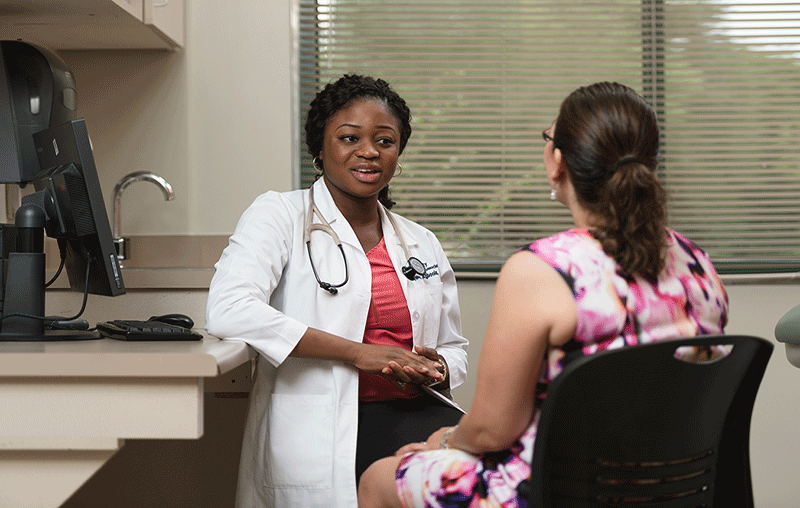Health Literacy
Health literacy is the ability to understand health care terms and information. This includes health care services, diagnoses, treatment options and more.
People with better health literacy tend to have better health outcomes. They may be better at taking medicine and speaking with their health care team. They also tend to trust their health care providers more.
At University Health, we are working to make sure everyone can make informed decisions about their health care.
Health Literacy's Impact on Health
Literacy is the ability to read and write. It affects how you process information. Nearly 48 million American adults cannot read or write above a 3rd grade level.
According to one report, about 90% of adults “have difficulty using the everyday health information that is routinely available in our health care facilities” and media.
When people don’t understand health information they find online or in brochures, they are less likely to make informed decisions about their care.
People who do not understand health information are more likely to:
- Skip medical screenings
- Get treatment in an emergency room
- Struggle to manage chronic conditions
- Miss follow-up appointments
According to one study, about 88% of adults don’t have the health literacy skills to navigate the health care system and advocate for themselves.
Nationally, health literacy is lowest among adults aged 65 and older, though these are the people who often need the most care.
Health Literacy in San Antonio
Low-income populations, minorities and older adults often have lower rates of health literacy. People with limited ability to speak and understand English may also have lower health literacy in areas where English is the most common language spoken.
How to Talk to Your Doctor
Communicating with a health care provider is key to getting the best health care. Participating in decision making includes knowing what questions to ask to fully understand a diagnosis, what the treatment options are, and what recovery might look like.
Here are some tips for better communication with your health care provider:
- Write down your questions before the visit and bring them with you
- Ask your doctor to write and share their notes from the visit
- Be honest with your provider about your medical history and lifestyle habits (drinking, smoking, etc.)
- Remember your doctor is there to help you – take time to ask all of your questions and talk about your concerns
- Bring a trusted friend or family member with you as an extra set of eyes and ears, and to ask questions you might forget
How to Prepare for Your Health Care Visit
Preparing for your health care visit can help you get the most out of it. Here are some tips to help your appointment go as planned:
- Compile a list of questions you may have
- Bring a list of all the medications you’re taking
- Ask a friend or family member to go with you
Questions to Ask Your Pharmacist about Your Medications
Pharmacists play an important role in health care and are here to help you understand your medications. Here are some questions you can ask your pharmacist:
- Do I have to take my medicine with food?
- When should I take my medications?
- Can you help me find medicines I can afford?
- Do I need to cut my pills in half? If so, can you provide a pill cutter?
- How do I use a blood sugar meter?
- How do I give myself insulin?
Pharmacists can also:
- Provide pillboxes to help store pills and schedule when to take medications
- Give immunizations to prevent illness
- Provide education about medication management
University Health Resources
Common Medical Terms & Their Meanings
The Patient Family Advisory Council at University Health compiled a glossary of common words and terms used in health care settings. This glossary provides easy to understand explanations of these phrases.
Online Health Library
Our online health library offers articles, videos and quizzes about a range of health care topics for adults and children. Find information about conditions and treatments, medications and supplements, nutrition and general wellness. It also features healthy recipes, a symptom checker, animations and risk assessments.
Interpreter Services
University Health offers language assistance services at all of our locations. Our goal is to eliminate language as a barrier and ensure that every patient and family member can communicate effectively.
Classes and Events
University Health educators lead classes designed to teach our community members specific skills to improve their health. Find classes and events on our website. Our health educators lead classes related to:
NurseLink
University Health NurseLink is a 24-hour phone triage line for existing University Health patients. Call any time of the day for medical advice from a University Health nurse. Nurses can also help schedule appointments at University Health locations. Call the NurseLink number at 210-358-3000.
Community Resources
Health Confianza
Health Confianza is a collaboration to improve health literacy led by the San Antonio Metropolitan Health District, UT Health San Antonio and the University of Texas at San Antonio.

